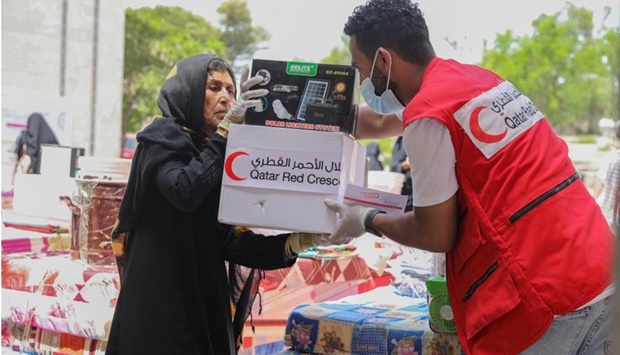The representation office of Qatar Red Crescent Society (QRCS) in Yemen has distributed shelter aid to 3,180 displaced and affected families in the governorates of Taiz, Dhale and Marib, as part of a $1.5mn project to provide nonfood items (NFIs) and housing rentals for vulnerable groups, with funding from the United Nations Office for the Co-ordination of Humanitarian Affairs’ (OCHA) Yemen Humanitarian Fund (YHF).

Shelter kits were distributed, each containing seven mattresses, seven blankets, two plastic mattresses, kitchenware, one solar lamp, two water buckets and one cooking stove. In Taiz, 2,100 shelter kits were distributed (1,400 in Jabal Habashi district and 700 in Al-Maafer district).
Bassam Al-Haddad, head of Al-Maafer Executive Unit, said: “Internally displaced persons (IDPs) in Al-Maafer suffer harsh conditions, and most of them live in uninhabitable places. Such interventions provide temporary solutions and improve the psychological and living conditions of IDPs. I would like to thank

YHF and QRCS for carrying out such projects."
Ali Hassan al-Marqab, deputy head of Marib IDP Executive Unit, praised the shelter supplies given to 500 families in Al-Juba district: “I really appreciate the role of donors in providing constant help for IDPs and those in need. Marib is hosts IDPs from all over Yemen. Our brothers in Qatar are expected to contribute more projects in the future. For decades, they have been generously supporting us in all the calamities we went through."
Mohamed al-Zaidi, director-general of Qa'atabah, Dhale, commended QRCS’s efforts to distribute shelter materials to 580 beneficiary families in the district. He thanked QRCS for well-organised distribution processes and called for more support in various humanitarian fields, as “the support provided does not meet the need”, according to him.
Under the project, six payments of cash assistance were given to 200 families in Qa'atabah and 500 families in Al-Maafer, in order to pay for housing rentals, at a value of $100 per month. Thus, the total number of beneficiary families is up to 3,380 displaced and war-affected families.

Shelter kits were distributed, each containing seven mattresses, seven blankets, two plastic mattresses, kitchenware, one solar lamp, two water buckets and one cooking stove. In Taiz, 2,100 shelter kits were distributed (1,400 in Jabal Habashi district and 700 in Al-Maafer district).
Bassam Al-Haddad, head of Al-Maafer Executive Unit, said: “Internally displaced persons (IDPs) in Al-Maafer suffer harsh conditions, and most of them live in uninhabitable places. Such interventions provide temporary solutions and improve the psychological and living conditions of IDPs. I would like to thank

YHF and QRCS for carrying out such projects."
Ali Hassan al-Marqab, deputy head of Marib IDP Executive Unit, praised the shelter supplies given to 500 families in Al-Juba district: “I really appreciate the role of donors in providing constant help for IDPs and those in need. Marib is hosts IDPs from all over Yemen. Our brothers in Qatar are expected to contribute more projects in the future. For decades, they have been generously supporting us in all the calamities we went through."
Mohamed al-Zaidi, director-general of Qa'atabah, Dhale, commended QRCS’s efforts to distribute shelter materials to 580 beneficiary families in the district. He thanked QRCS for well-organised distribution processes and called for more support in various humanitarian fields, as “the support provided does not meet the need”, according to him.
Under the project, six payments of cash assistance were given to 200 families in Qa'atabah and 500 families in Al-Maafer, in order to pay for housing rentals, at a value of $100 per month. Thus, the total number of beneficiary families is up to 3,380 displaced and war-affected families.

